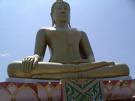
IMPORTANCE OF MEDITATION Meditation on God is the most effective way of controlling the mind. Meditation and control of mind go hand in hand. The highest objective for which one controls the mind is meditation on God or Atman as the case may be. However, meditation also helps control of the mind.The mind must be riveted on something which is not only pure in itself but can also purify our mind through its power. Meditation on God is advised, because one becomes imbued with the quality of the object on which one meditates. In meditation, whenever the mind strays away one should indefatigably bring it back and place it on the object of meditation. unless you meditate, the minnd cannot be controlled, and unless the mind is controlled, you cannot meditate. But if you think,"first let me control the mind then I shall meditate", You will never enter the path of spiritual life. You must do both at the same time- steady your mind and meditate.




